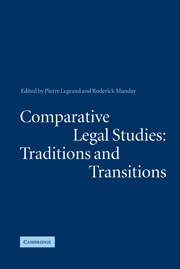Book contents
- Frontmatter
- Contents
- List of contributors
- Introduction
- Comparative legal studies and its legacies
- Comparative legal studies and its boundaries
- Comparative legal studies and its theories
- 8 The question of understanding
- 9 The same and the different
- 10 The neo-Romantic turn
- 11 The methods and the politics
- Comparative legal studies and its futures
- Conclusion
- Index
11 - The methods and the politics
Published online by Cambridge University Press: 18 December 2009
- Frontmatter
- Contents
- List of contributors
- Introduction
- Comparative legal studies and its legacies
- Comparative legal studies and its boundaries
- Comparative legal studies and its theories
- 8 The question of understanding
- 9 The same and the different
- 10 The neo-Romantic turn
- 11 The methods and the politics
- Comparative legal studies and its futures
- Conclusion
- Index
Summary
Comparative law as governance
The broad mainstream of comparative law today is careful to distance itself from the work of governance and the choices of political life. Discomfort with politics is common to comparatists who seek knowledge about foreign legal systems more or less for its own sake and those who see themselves as technicians in a project whose political direction has been determined elsewhere. This has not always been true of comparative law and it distinguishes the field from other legal disciplines today. This essay explores the argumentative machinery that generates comparative law's apolitical sensibility and asks whether this practice itself has a politics. I develop some hypotheses about its historical origins and disciplinary specificity and end with some thoughts about its contribution to global governance.
A professional discipline might be thought ‘to be political’ or ‘participate in governance’ in a variety of ways. Sometimes, disciplines participate actively in ideological debates within the broader society, taking positions we can associate easily with the left, centre or right. Sometimes, they harness their expertise to the interests of one or another social group, so that we identify their work with the interests of workers or industrialists, men or women. Disciplines may take positions on the broad choices governments make, promoting, say, centralization over decentralization or assimilation over cultural diversity. Professions may urge their members to participate in public life, exercising the levers of governmental authority by applying the profession's special knowledge or viewpoint.
- Type
- Chapter
- Information
- Comparative Legal Studies: Traditions and Transitions , pp. 345 - 434Publisher: Cambridge University PressPrint publication year: 2003
- 18
- Cited by



